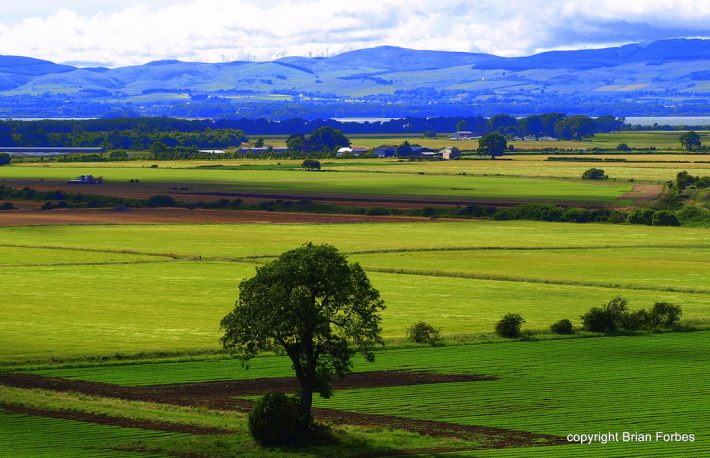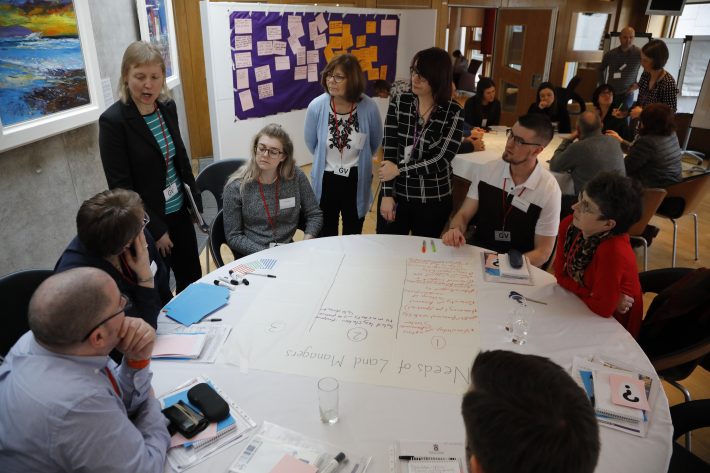Twenty-two Scottish People
Observing a Citizen Jury debating how funding for land-use management could be structured to help improve Scotland’s natural environment.

I spent last weekend in the Scottish Parliament observing a first of its kind event – a Citizen Jury of 22 people from all over Scotland participating in 2 ½ days of learning, debating, and consensus building – to inform the work of the Scottish Parliament’s Environment, Climate Change, and Land Reform (ECCLR) Committee.
The idea behind the event was to engage the wider public to get involved with the work of the Parliament – and to back that up, the ECCLR Committee committed to carefully consider the recommendations of the Jury in their upcoming work.
For me the weekend started on Saturday morning inside the Scottish Parliament in Edinburgh. For everyone else, their work began the previous evening when over dinner, the Jury were given an introduction to the weekend and advice on critical thinking. I was given the opportunity to attend through my work placement with the BES – Scottish Policy Group. My boss, Dr. Maggie Keegan, was on the steering committee for the event.
I was intrigued about the event as soon as I heard about it, but fascinated mostly by what these 22 people chosen at random would think of the whole idea and process.
The citizens of the jury were selected from an initial group of respondents to letters sent to three thousand randomly selected households across Scotland. From those respondents, participants were chosen to represent a diversity of gender, background, and age.
As an observer, I wasn’t able to talk to the jury during the weekend – but I watched as the group sat through sessions of evidence-giving by panels of experts on Scotland’s environment and land management systems and fully engaged with every debate and point of view.
The topic of the weekend related to upcoming work of the ECCLR Committee on biodiversity in Scotland, in relation to how funding for land use management post Brexit could be structured to help improve Scotland’s natural environment. As an ecologist with years of training behind me, it was really cool to see this diverse group, with no prior experience, tackle such high-level and in-depth environmental knowledge and the workshop-style way of working.

Those in the room with experience of similar public participation activities noted the particularly high level of engagement in this group. I don’t know if this was because the group was just good, or the subject matter was particularly suitable, or due to the format of delivery. But I managed to speak to a few Jury members once it was all over – and the consensus seemed to be that it was an exceptionally good event and something that should be done more often.
Personally, I was happy to see many of the Jury put forward very progressive environmental views. There seemed to be agreement that we as a society should be doing more to protect the environment and leave it in a better state for future generations.
I had hopes for some radical and unique ideas from people unencumbered by the constraints of traditional political thinking. In fact, agreement around the recommendations seemed like pretty common-sense thinking – which I suppose could be seen as radical by some.
This was the first time the Parliament has run an event of this kind. The whole process was independently evaluated so that future Citizen Jury events can learn from this one and hopefully become a stable feature of Scotland’s participative and transparent political system.
I don’t know if the Jury were given any training on the various ways that members of the public can engage with policy making – but it would be brilliant if Jurors keep in touch with the work of the ECCLR Committee and the Parliament in general. Maybe even become involved with responding to future government consultations, or get involved with local politics!
Overall, I think it was a very successful demonstration that people can come to informed consensus on complex matters of national interest. Now imagine if the process was repeated with more groups locally, regionally, and nationally and on different topics!
Like what we stand for?
Support our mission and help develop the next generation of ecologists by donating to the British Ecological Society.